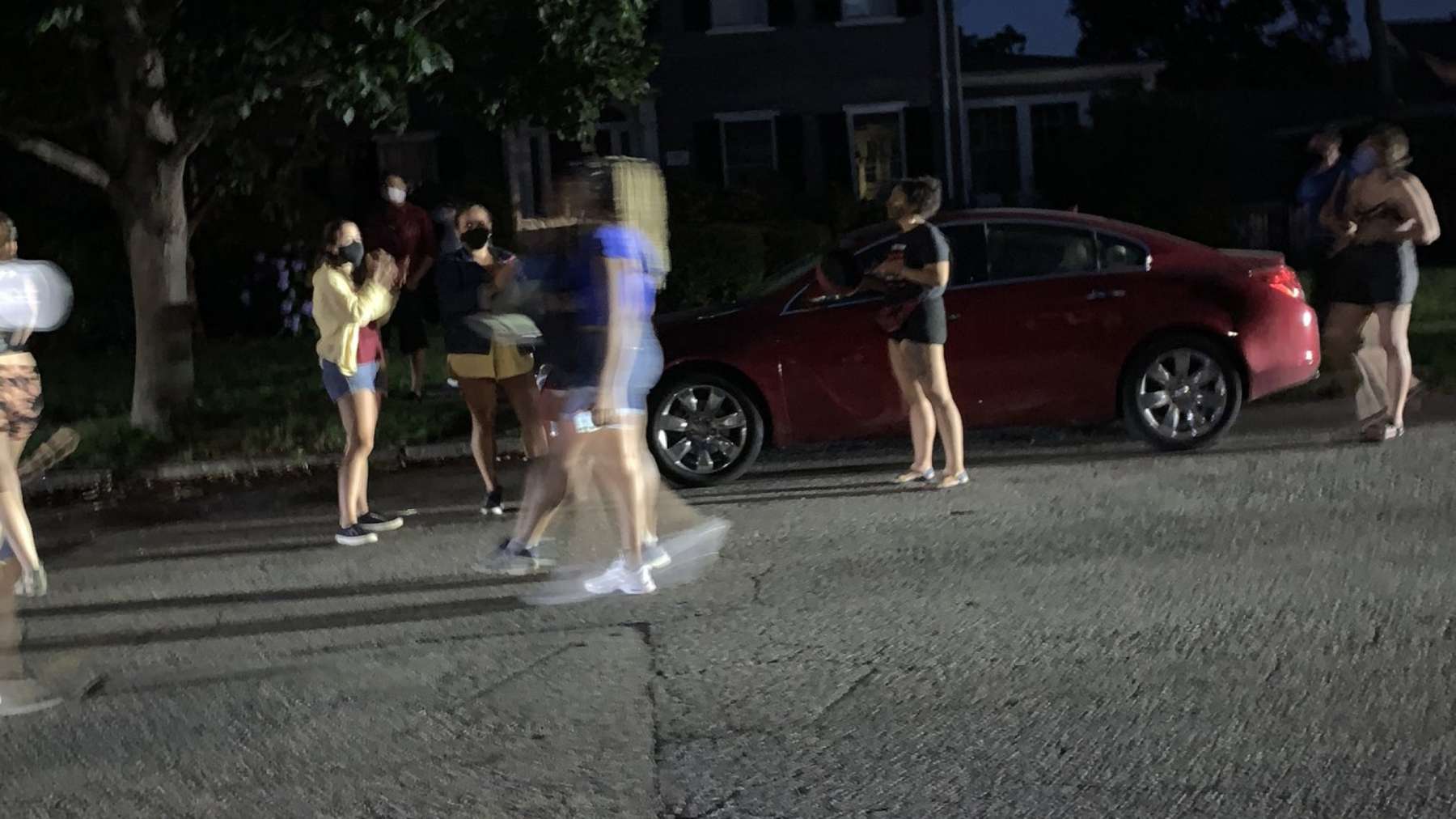MATCH statement on protest outside Governor’s home
The following is a statement from the organizers of Sunday night’s protest outside the home of Rhode Island Governor Gina Raimondo. The statement is presented in full: On Sunday July 12, Making Abolition Though Collective Humanity (MATCH), an informal multi-racial collective of prison and police abolitionists, and about 25 other activists took police by surprise with a disruption at the Governor’s Mansion. A
July 14, 2020, 9:04 am
By Making Abolition Through Collective Humanity
The following is a statement from the organizers of Sunday night’s protest outside the home of Rhode Island Governor Gina Raimondo. The statement is presented in full:
On Sunday July 12, Making Abolition Though Collective Humanity (MATCH), an informal multi-racial collective of prison and police abolitionists, and about 25 other activists took police by surprise with a disruption at the Governor’s Mansion. A small group of activists with their own objectives to speak with the Governor showed up with a megaphone prior to the scheduled event, and dozens of State and Providence police quickly poured in to protect their Politician and the wealthy neighborhood’s Private Property.
dozens of people outside @GovRaimondo home chanting “no justice no sleep, defund the police” pic.twitter.com/rKVGwipbGw
— abolish policing (@showandtal) July 13, 2020
Providence police car number 15 rammed into protesters; Fortunately no injuries were reported. Police were able to cordon off car access to the mansion because of an uncoordinated, divided initial mobilization. This was a strategic error in our opinion and something the movement must reflect on and prevent in the future.
A procession of five to ten vehicles showed up around 9 PM to demonstrate in favor of the abolition of police and prisons. We honked horns obnoxiously, blared Sound of da Police with portable speakers (which annoyed the police immensely) and set off fireworks. Neighbors watched from their porches.
A white neighbor might argue that this action went too far, yet we believe escalations are warranted. Governor Raimondo was given the opportunity to take action toward police abolition for weeks of relatively non-disruptive, yet powerful, massive protests on the streets of Providence and elsewhere throughout the State. She has instead paid lip service to the movement by prioritizing symbolic gestures over material action. As some other States and cities move toward defunding the police, Raimondo’s tone deaf proposed State budget increases funding for both police and prisons. Meanwhile, Rhode Island ranks fifth in the United States for having the largest spending gap between money spent on schools and prisons: the State spends $15,532 per students and $58,564. Students deserve much better funding, and people deserve to be free.
Mayor Elorza’s and Governor Raimondo’s statements crafted in response to demonstrations at their homes both reference continued dialogue with “Black leaders,” a tokenizing sentiment that treats Black people as a monolith and tacitly suggests Black working class folks need Black professionals to speak on their behalf.
Many white liberals may defend Governor Raimondo, claiming that she has helped keep Rhode Islander’s safe during the pandemic. Our response would be: who is she keeping safe? Not the predominantly Black and brown people who have been forced to work throughout the pandemic in order to keep capitalism afloat. Not the working class Black and brown people who face continual harassment and violence in our own neighborhoods by police.
We will be back and we encourage all who value leaderless resistance, with the ultimate goal of abolition, to join us. Let us not recreate rule and governance, the source of all oppression, within our movement spaces.
“The reinvention of daily life means marching off the edge of our maps.” –Lucy Parsons
“We must devastate the avenues where the wealthy live.” –Lucy Parsons
Signed,
Making Abolition Through Collective Humanity (MATCH)
Not a single cop wearing a mask, @GovRaimondo why don’t you tell your goons to knock it off pic.twitter.com/ZyDtQxMvyR
— abolish policing (@showandtal) July 13, 2020
Providence police car 15 drove into line of protestors in the street pic.twitter.com/SSNmW5mrTU
— abolish policing (@showandtal) July 13, 2020
At least 10 state and providence police cars blocking Morris ave pic.twitter.com/gpllq7v82t
— abolish policing (@showandtal) July 13, 2020
Providence police and RI state police w their masks off for no reason. Who do they protect? Who do they serve? pic.twitter.com/QzYQE5sAIn
— abolish policing (@showandtal) July 13, 2020
One officer was wearing a mask tonight, but he said he’s “not responsible” for the officers not wearing masks.
— abolish policing (@showandtal) July 13, 2020
If we cant expect cops to call each other out for endangering public health during a global pandemic, when will they ever be held accountable?
Defund & Abolish police pic.twitter.com/A1eHgCIj3s
Protesting in front of Rhode Island @GovRaimondo’s house tonight. Majority of cars have Mass plates. #providence #Raimondo #defund pic.twitter.com/EhaIaJyTlm
— Andrew Binder (@andy_rednib) July 13, 2020






